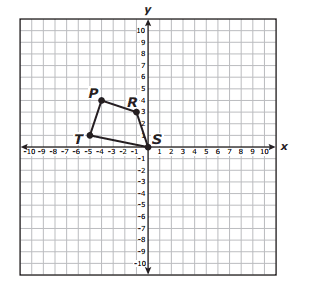
Topic Review: Two-Dimensional Shapes
Quiz by Grade 8 Math - Texas Education Agency
Grade 8
Math (Archived)
Texas Essential Knowledge and Skills (TEKS)
Feel free to use or edit a copy
includes Teacher and Student dashboards
Measures 4 skills from
Measures 4 skills from
Track each student's skills and progress in your Mastery dashboards
With a free account, teachers can
- edit the questions
- save a copy for later
- start a class game
- automatically assign follow-up activities based on students’ scores
- assign as homework
- share a link with colleagues
- print as a bubble sheet
11 questions
Show answers
- Q1Quadrilateral PRST is transformed according to the rule ( x, y ) → (x + 9, y + 4 ) to create quadrilateral P'R′S'T′ Which statement is true?The angle measures of quadrilateral P' R′ S' T′ are equal to the corresponding angle measures of quadrilateral PRST.The angle measures of quadrilateral P' R′ S' T′ are greater than the corresponding angle measures of quadrilateral PRST.The side lengths of quadrilateral P' R′ S' T′ are twice the corresponding side lengths of quadrilateral PRST.The side lengths of quadrilateral P' R′ S' T′ are 9 units longer than the corresponding side lengths of quadrilateral PRST.60s8.10.A: Two-Dimensional Shapes
- Q2A transformation is applied to a figure to create a new figure. Which transformation does not preserve congruence?A reflection across the x-axisA translation 7 units downA dilation by a scale factor of 5A rotation of 90° clockwise60s8.10.B: Two-Dimensional Shapes
- Q3A figure is graphed on a coordinate grid as shown. The figure is rotated 180° clockwise with the origin as the center of rotation to create a new figure. Which rule describes this transformation?(x, y ) → (x, −y)( x, y ) → (− y, −x)(x, y ) → ( -x, y)(x, y ) → (− x, −y)60s8.10.C: Two-Dimensional Shapes
- Q4The coordinate grid shows parallelogram PQRS. Parallelogram PQRS is rotated 90° clockwise about the origin to create parallelogram PQRS′. Which rule describes this transformation?(x , y)→ ( x, -y)(x , y)→ ( y,x)(x , y)→ ( y,-x)(x , y)→ ( -x, y)60s8.10.C: Two-Dimensional Shapes
- Q5A preschool has a rectangular field and a rectangular playground that are similar in shape. Each dimension of the field is 3.2 times the corresponding dimension of the playground. Which statement is true?The area of the field is 6.4 times the area of the playground.The perimeter of the field is 10.24 times the perimeter of the playground.The area of the field is 10.24 times the area of the playground.The perimeter of the field is 6.4 times the perimeter of the playground.60s8.10.D: Two-Dimensional Shapes
- Q6The coordinates of the vertices of a quadrilateral are P (1, 2), R (1, 4), S (3, 4), and T (4, 2). Quadrilateral PRST is reflected across the y-axis to create quadrilateral P'R'S'T' Which rule describes this transformation?(x , y)→ ( -x, y)(x , y)→ ( y,-x)(x , y)→ ( x, -y)(x , y)→ ( -y,x)60s8.10.C: Two-Dimensional Shapes
- Q7Which representation of a transformation on a coordinate grid does not preserve congruence?(x , y)→ ( 1/7x, 1/7y)(x , y)→ ( y,-x)(x , y)→ (x,-y)(x, y ) → (x + 7,y + 7)60s8.10.B: Two-Dimensional Shapes
- Q8Triangle ABC was translated 2 units to the right and 3 units down. Which rule describes the translation that was applied to triangle ABC to create triangle A'B'C ′?(x ,y ) → (- 3x, 2y )(x ,y ) → (2x, - 3y )(x ,y ) → (x +2, y -3)(x ,y ) → (x - 3, y + 2)60s8.10.C: Two-Dimensional Shapes
- Q9Pentagon ABCDE is rotated 180° clockwise about the origin to form pentagon A'B'C'D'E'. Which statement is true?Each side length of pentagon A'B'C'D'E' is 2 times the corresponding side length of pentagon ABCDE.Each side length of pentagon A'B'C'D'E' is 1/2 the corresponding side length of pentagon ABCDE.Pentagon ABCDE is congruent to pentagon A'B'C'D'E'The sum of the angle measures of pentagon A'B'C'D'E' is 180° more than the sum of the angle measures of pentagon ABCDE.60s8.10.A: Two-Dimensional Shapes
- Q10The coordinate grid shows a pentagon. The pentagon is translated 1 unit to the left and 10 units down to create a new pentagon. Which rule describes this transformation?( x ,y) → ( x − 1, y − 10)( x ,y) → ( x − 1, y +10)( x ,y) → ( x + 1, y +10)( x ,y) → ( x +1, y − 10)60s8.10.C: Two-Dimensional Shapes
- Q11A circle is graphed on a coordinate grid and then reflected across the y-axis. If the center of the original circle was located at ( , x y), which ordered pair represents the center of the new circle after the transformation?(-x, -y)(x, -y)(-x, y)(x, y)60s8.10.C: Two-Dimensional Shapes
